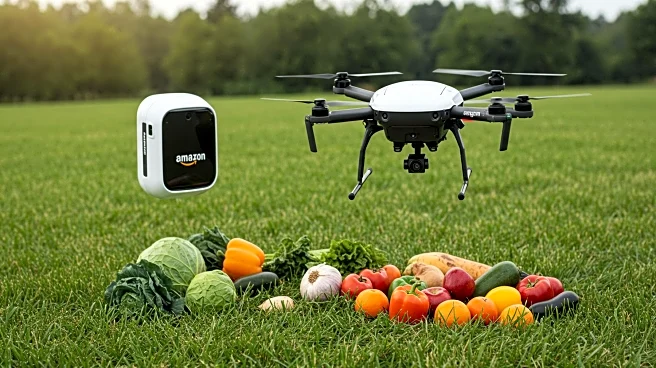What's Happening?
Amazon has announced the expansion of its perishable delivery service, allowing Prime members in over 1,000 cities and towns to order fresh groceries alongside other items for same-day delivery. This service is available for orders over $25, with plans to extend to more than 2,300 locations by the end of the year. The move is part of Amazon's strategy to integrate thousands of perishable items into its logistics network, challenging grocery delivery services from competitors like Walmart, Kroger, and Target. Amazon's shares rose by 1% following the announcement, while shares of its rivals saw a decline.
Why It's Important?
The expansion of Amazon's perishable delivery service represents a significant shift in the grocery industry, potentially altering consumer shopping habits and increasing competition among major retailers. By offering same-day delivery of fresh groceries, Amazon is enhancing its appeal to Prime members, which could lead to increased membership and sales. This move may force traditional grocers to innovate and improve their delivery services to maintain market share. The integration of perishable items into Amazon's logistics network could streamline operations and reduce costs, benefiting both the company and its customers.
What's Next?
Amazon plans to continue expanding its delivery service, reaching more cities and towns by year-end. The company is investing over $4 billion to triple the size of its delivery network by 2026, focusing on small towns and rural communities. As Amazon enhances its service, traditional grocers may need to adapt by improving their delivery options or offering competitive pricing to retain customers. The use of artificial intelligence to predict local preferences could further refine Amazon's offerings, potentially leading to more personalized shopping experiences.
Beyond the Headlines
Amazon's expansion into perishable delivery highlights the growing importance of convenience and speed in consumer shopping preferences. The integration of fresh groceries with other items in a single cart simplifies the shopping process, potentially increasing customer loyalty. This development may also raise questions about the environmental impact of increased delivery services and the sustainability of Amazon's logistics network. As the company continues to innovate, it may face scrutiny over labor practices and the treatment of workers involved in its delivery operations.









